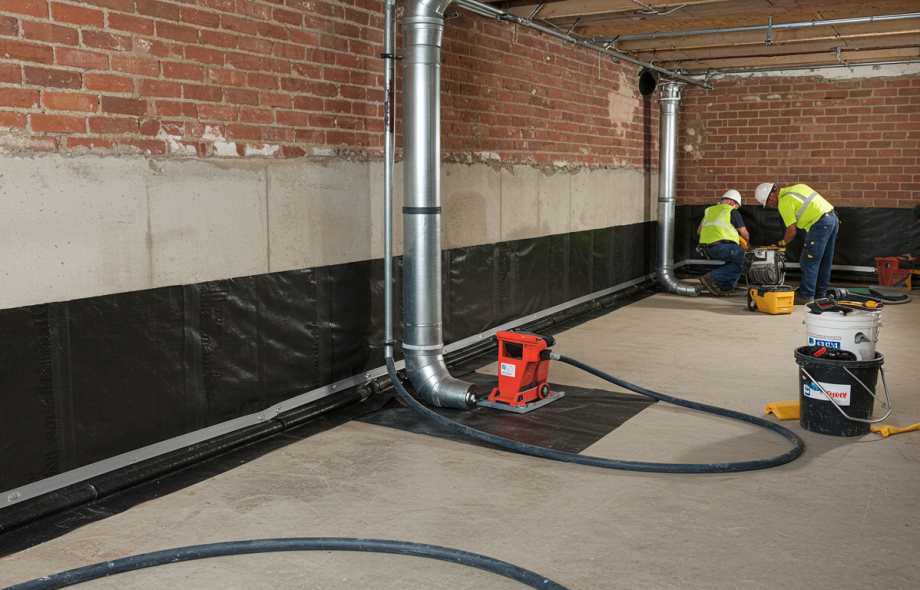Basement Waterproofing: Why It’s More Important Than You Think
A dry basement is often overlooked by homeowners, yet it is one of the most critical areas to protect. Proper Basement waterproofing safeguards your home against structural damage, mold growth, and financial loss. Many homeowners underestimate the risks of water intrusion, but even minor leaks can lead to serious long-term problems.
This article explores why basement waterproofing is essential, the methods available, and practical advice for maintaining a dry, secure basement.
Understanding the Risks of a Wet Basement
Basements are particularly vulnerable because they sit below ground level, making them prone to water infiltration from:
- Heavy rainfall and flooding
- High groundwater levels
- Plumbing leaks or faulty drainage systems
Ignoring basement leaks can result in:
- Structural Damage: Continuous water exposure can weaken foundation walls and floors.
- Health Hazards: Damp conditions promote mold and mildew growth, which can trigger respiratory issues and allergies.
- Property Damage: Stored items, electronics, and furniture are at risk.
- Decreased Home Value: Potential buyers may view a wet basement as a serious concern.
Basement waterproofing mitigates these risks and ensures long-term safety and value for your property.
Types of Basement Waterproofing
Homeowners can choose from several methods depending on the severity of water issues and budget:
1. Interior Waterproofing
Interior solutions include installing drainage systems, sump pumps, or wall coatings to redirect water away from the basement. This is effective for minor seepage and existing wet areas.
- Pros: Cost-effective, suitable for already constructed basements.
- Cons: Does not prevent water from reaching the exterior walls.
2. Exterior Waterproofing
Exterior waterproofing involves excavating around the foundation, applying waterproof membranes, and installing external drainage. It is ideal for preventing water from entering in the first place.
- Pros: Long-lasting, protects the foundation and walls.
- Cons: Higher upfront cost and labor-intensive.
3. Foundation Sealants and Coatings
Specialized waterproof coatings and sealants are applied to walls and floors to prevent water infiltration. Often used alongside other methods for enhanced protection.
- Pros: Easy application, suitable for small leaks.
- Cons: Not effective for major water intrusion.
Key Benefits of Basement Waterproofing
1. Protect Structural Integrity
Water penetration creates hydrostatic pressure on basement walls, leading to cracks and potential settlement. Waterproofing preserves the foundation and prevents costly structural repairs.
2. Prevent Mold and Mildew
Mold thrives in damp environments. Proper waterproofing prevents health hazards by maintaining a dry basement environment. The Environmental Protection Agency (EPA) warns that mold exposure can lead to asthma attacks, allergies, and other respiratory issues.
3. Preserve Stored Belongings
Basements often serve as storage spaces. Waterproofing protects furniture, electronics, and personal items from water damage, preventing costly replacement or repair.
4. Increase Usable Living Space
Waterproofed basements can be converted into home offices, gyms, or recreation rooms. This not only adds functional space but also increases property value.
5. Long-Term Cost Savings
While waterproofing requires initial investment, it prevents expensive repairs from water damage, mold remediation, and structural issues. On average, basement water damage repairs can cost ₹7–20 lakhs, making proactive waterproofing cost-effective in the long run.
Signs You Need Basement Waterproofing
Early detection allows homeowners to address problems before they escalate. Common signs include:
- Water stains on walls and floors
- Musty odors or visible mold growth
- White, powdery residue (efflorescence) on walls
- Cracks in foundation walls
- Persistent dampness or condensation on windows
Regular inspections and professional assessments help identify vulnerabilities and prevent serious damage.
Choosing the Right Basement Waterproofing Service
Selecting a reliable service provider is essential for effective waterproofing. Consider the following factors:
- Experience and Expertise: Choose companies with a proven track record in basement waterproofing.
- Warranty and Guarantee: Ensure coverage for materials and workmanship.
- Customized Solutions: Each home is unique, requiring tailored strategies based on soil, foundation type, and water sources.
- Customer Reviews: Positive client feedback indicates trustworthiness and performance.
- Compliance with Standards: Methods should meet local building codes and safety regulations.
Professional guidance ensures the waterproofing method is suited to your home’s specific needs.
Complementary Measures for Dry Basements
- French Drains: Redirect water away from foundations.
- Sump Pumps: Remove accumulated water automatically.
- Gutter Maintenance: Prevent water pooling near your home.
- Proper Grading: Landscaping should slope away from the foundation.
A holistic approach combines waterproofing with effective water management, ensuring long-term protection.
Cost Considerations and ROI
Basement waterproofing costs vary depending on method, home size, and severity of leaks. Typical ranges:
- Interior waterproofing: ₹3–7 lakhs
- Exterior waterproofing: ₹7–15 lakhs
- Sealants and coatings: ₹1–3 lakhs
The investment pays off by preventing major damage and maintaining property value.
Conclusion: Basement Waterproofing is Essential
Water infiltration can cause significant structural damage, mold growth, and financial loss. Professional Basement waterproofing safeguards your home, protects your family’s health, and preserves property value.
From protecting foundations to enabling usable living space and preventing costly repairs, waterproofing is a critical investment. By choosing experienced professionals, addressing early warning signs, and combining methods with effective water management, homeowners can ensure a dry, secure, and valuable basement for years to come.
 :
https://waterproofers.in
:
https://waterproofers.in

